
support team
Faculty of Journalism of Moscow State University n.a. M.V. Lomonosov
The Department of Journalism was established in 1947 in the Faculty of Philology of Moscow State University. Senior teacher Timofei Ivanovich Antropov became the head of the department.
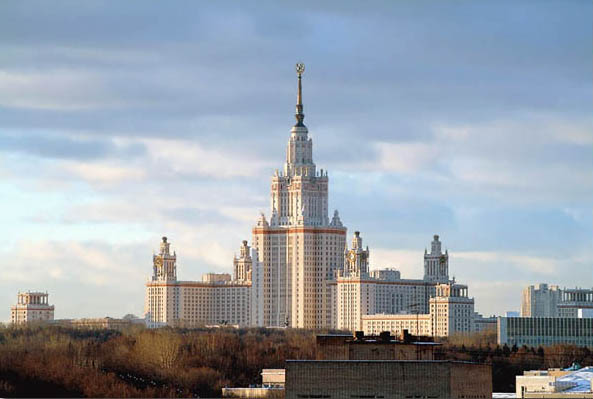
From the very first days of the establishment of the journalism department at the Faculty of Philology of Moscow State University; the main philological and historical disciplines of history of Russian and Soviet journalism were taught. Associate professor Efim Stepanovich Ukhalov was the organizer of the course of the history of Russian journalism. There was no university course on this subject, later its basis consisted of lectures and programmes on the journalism of the High Party School.
In 1950, journalism students had their first work practice in the editorial offices of central and regional newspapers. Since that time two month internships in central and regional newspapers after the 3rd and 4th year became mandatory to the programme.
In 1952, by the decree of the Council of Ministers of the USSR, the Faculty of Journalism was opened on the base of the Journalism Department of Philology Faculty of Lomonosov Moscow State University and the Editorial Publishing Faculty of Moscow Polygraphic Institute. Associate Professor Evgeny Lazarevich Khudiakov was appointed the Dean, Associate Professor Peter Fyodorovich Yushin – Deputy Dean.
Since the establishment of the faculty in 1952 there were only three departments: the Department of History, Theory and Practice of Soviet Printing (the Head - Associate Professor Evgeny Lazarevich Khudiakov); the Department of History of Russian Journalism and Literature (the Head - Associate Professor Efim Stepanovich Ukhalov) and the Department of Russian Language Stylistics (the Head – Professor Konstantin Iakinfovich Bylinsky).
In 1953, the editing and publishing department was formed. In 1958, the division of training of television and radio journalists began. In 1962, the Newspaper and Media techniques department was created. The Literary Criticism and Publicities Department has been in existence since 1977. On the eve of the fiftieth anniversary of journalism establishment in Moscow State University, the opening of two more departments came about: in 1989: Media Theory and Economics, in 1990: Sociology.
The Faculty of Journalism prepares students as specialists to work in newspapers, magazines, publishing houses, television and broadcasting editorial offices, advertising agencies and public relation firms. The educational programme instructs the training of photojournalists, specialists in the field of editorial publishing, art culture and mass media design, secretaries in editorial boards, and international journalists.
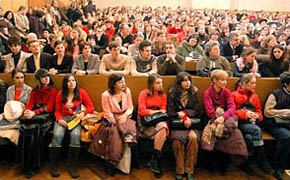
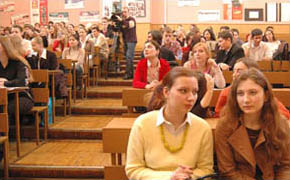
The faculty consists of 13 departments: Periodical Press, Radio and Television, Editing, Publishing and Informatics, Media Theory and Economics, Sociology, Media Techniques, History of Russian Journalism and Literature, History of Russian Mass Media, Literary Criticism and Publicities, History of Foreign Journalism and Literature, as well as Russian Language Stylistics.
The educational programme consists of several main cycles: general politic disciplines, philological disciplines and specialization disciplines.
Within the framework of general politics: students learn economic theory basics, history of philosophical thought, history of CIS countries, modern history, also the history of Russian and foreign journalism.
A lot of attention at the faculty is paid to the training of future journalists. The cycle of philological disciplines is provided for the whole period of education and includes theory and history of Russian and foreign literature.
Specialization disciplines play a leading role in the professional training of journalists. Lectures and practical studies are planned in such a way so that the students will be able to not only learn the theory of journalism, but also to get practical skills within mass media.
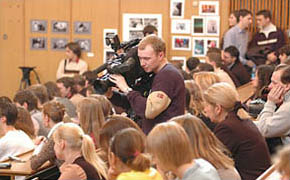
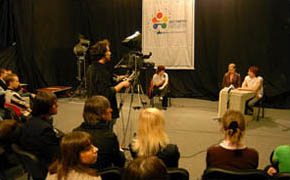
Students learn the theory and methodology of journalism, organization of Press agencies, obtain skills in literature work at editorial offices, and learn to prepare texts for television and radio programmes.
The Educational Polygraphic Laboratory, Radio and TV Centre is the training base for journalists.
Students have work practice/internships at Russian editorial offices of newspapers, magazines, broadcasting and television, work in creative workshops and studios. During their work practice/internships students take part in the faculty newspaper “Journalist”, educational brochures, also create educational radio and television programmes.
Faculty graduates get a diploma in “Journalism”. In the diploma attachment there is a specified specialization, depending on the student’s department: “Periodical press”, “Periodical press - Editorial secretariat”, “Television”, “Broadcasting”, “Advertising”, "Public relations", “Photojournalism”, “Editing and Publishing”, “Art Culture”, or “International Journalism”. Students, who have completed an intensive programme of learning foreign languages, get an additional qualification of “Specialist with Foreign Language Skills”.
The faculty has a day, evening and correspondence department. The Education term at the day department is 5 years, at the evening and correspondence department its 6 years.
Students who have a Bachelor or Specialist diploma are admitted to the MA course (education term is 2 years).
|
Contact information: |